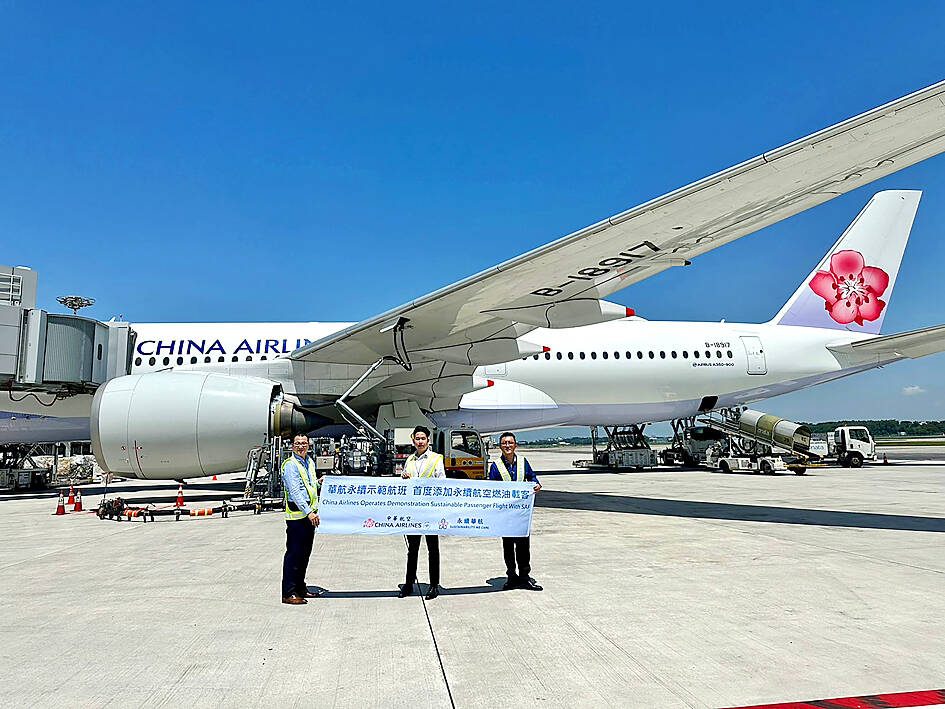China Airlines Ltd (CAL, 中華航空) yesterday launched its first passenger flight from Taipei to Singapore using sustainable aviation fuel, as the carrier aims to reduce carbon emissions despite higher costs.
The airline said it used 10 percent sustainable aviation fuel (SAF), which is made from renewable waste and residue materials such as cooking oil, and 90 percent traditional jet fuel for the flight.
As SAF generates 80 percent less carbon emissions than fossil jet fuel, CAL strategic planning department general manger James Chung (鍾人傑) said yesterday’s flight reduced carbon emissions by 8 percent.

Photo courtesy of China Airlines Ltd
The airline has used SAF for cargo flights for several years, but yesterday’s flight was its first passenger flight, as the Civil Aeronautics Administration is more cautious about airlines using the fuel than its foreign counterparts, Chung said.
The International Air Transport Association has tested a combination of 50 percent SAF and 50 percent fossil jet fuel, and found that it is safe, he said.
The European Council has mandated that all aviation fuel suppliers provide fuel containing at least 2 percent SAF by 2025, Chung said.
However, it is unlikely that the airline would use 100 percent SAF for passenger flights, as it is double the cost of traditional jet fuel and lacks sufficient domestic supply, he said.
“For a mid-haul flight from Taipei to Singapore, it costs us about US$10,000 more to use the 10 percent SAF, which is not particularly high, but if we use 100 percent SAF, the additional expense would be US$100,000,” Chung said.
The extra cost of using SAF would affect ticket prices, he said, adding that the airline would prefer to raise the proportion of SAF gradually.
The government should set up a policy to develop a domestic supply chain of SAF, and make it accessible to all airlines, he said.

In Italy’s storied gold-making hubs, jewelers are reworking their designs to trim gold content as they race to blunt the effect of record prices and appeal to shoppers watching their budgets. Gold prices hit a record high on Thursday, surging near US$5,600 an ounce, more than double a year ago as geopolitical concerns and jitters over trade pushed investors toward the safe-haven asset. The rally is putting undue pressure on small artisans as they face mounting demands from customers, including international brands, to produce cheaper items, from signature pieces to wedding rings, according to interviews with four independent jewelers in Italy’s main

Macronix International Co (旺宏), the world’s biggest NOR flash memory supplier, yesterday said it would spend NT$22 billion (US$699.1 million) on capacity expansion this year to increase its production of mid-to-low-density memory chips as the world’s major memorychip suppliers are phasing out the market. The company said its planned capital expenditures are about 11 times higher than the NT$1.8 billion it spent on new facilities and equipment last year. A majority of this year’s outlay would be allocated to step up capacity of multi-level cell (MLC) NAND flash memory chips, which are used in embedded multimedia cards (eMMC), a managed

Japanese Prime Minister Sanae Takaichi has talked up the benefits of a weaker yen in a campaign speech, adopting a tone at odds with her finance ministry, which has refused to rule out any options to counter excessive foreign exchange volatility. Takaichi later softened her stance, saying she did not have a preference for the yen’s direction. “People say the weak yen is bad right now, but for export industries, it’s a major opportunity,” Takaichi said on Saturday at a rally for Liberal Democratic Party candidate Daishiro Yamagiwa in Kanagawa Prefecture ahead of a snap election on Sunday. “Whether it’s selling food or

In the wake of strong global demand for AI applications, Taiwan’s export-oriented economy accelerated with the composite index of economic indicators flashing the first “red” light in December for one year, indicating the economy is in booming mode, the National Development Council (NDC) said yesterday. Moreover, the index of leading indicators, which gauges the potential state of the economy over the next six months, also moved higher in December amid growing optimism over the outlook, the NDC said. In December, the index of economic indicators rose one point from a month earlier to 38, at the lower end of the “red” light.